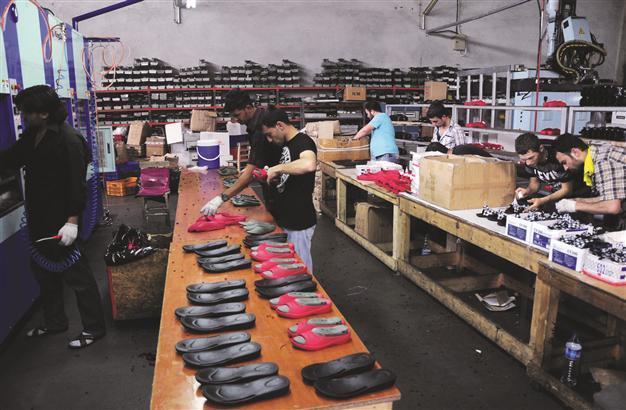Minister asks for more trade in liras
ANKARA - Anatolia News Agency

Turkish workers assemble slippers for export in Gaziantep.
Turkey is set to increase the number of imports and exports it conducts in Turkish Liras, Economy Minister Zafer Çağlayan has said, noting that the trend would help the currency become a preferred unit of transaction in the future.“The increase in the usage of the Turkish Lira in foreign trade is going to add to the currency’s recognition and the new symbol of the lira is also going to help. The Economy Ministry’s policies vis-à-vis the real economy and the strategic steps it takes will heighten Turkey’s position as a reliable and safe economic center. This will add to the strength of the lira,” he said.
The lira will become a preferred currency as part of Turkey’s vision to become one of the top 10 global economies by 2023, the minister said.
Although the ministry is targeting greater trade in liras, 46 percent of Turkish exports were made in U.S. dollars in the first six months of 2012, 48 percent were made in euros while 2.8 percent were conducted in liras.
Çağlayan said there were important reasons behind the choice of currency when a country engages in foreign trade.
“According to academic studies, factors like an industry’s specificities, regional trade structures, [the use of] a currency that can be used internationally, macroeconomic stability and liquidity preferences shape the choice behind opting for a particular currency,” said Çağlayan.
Exports to 186 countries and imports from 127 countries and regions were conducted in liras last year, he said, adding that exports and imports were made with 181 countries and regions in the first six months of 2012.
Turkey exported in liras to new destinations like Aruba, Burma, the Cocos Islands, Ecuador, Eritrea, Kiribati, the Maldives, Nicaragua, San Marino and the Seychelles. Similarly, the country imported in liras from Qatar, Christmas Island, Bahrain, Sudan, Libya, Ethiopia, Senegal, Oman, Lebanon and Sierra Leone.
According to Çağlayan, most of Turkey’s imports that were conducted in euros with non-European countries were with Argentina, Algeria and Iran.
















